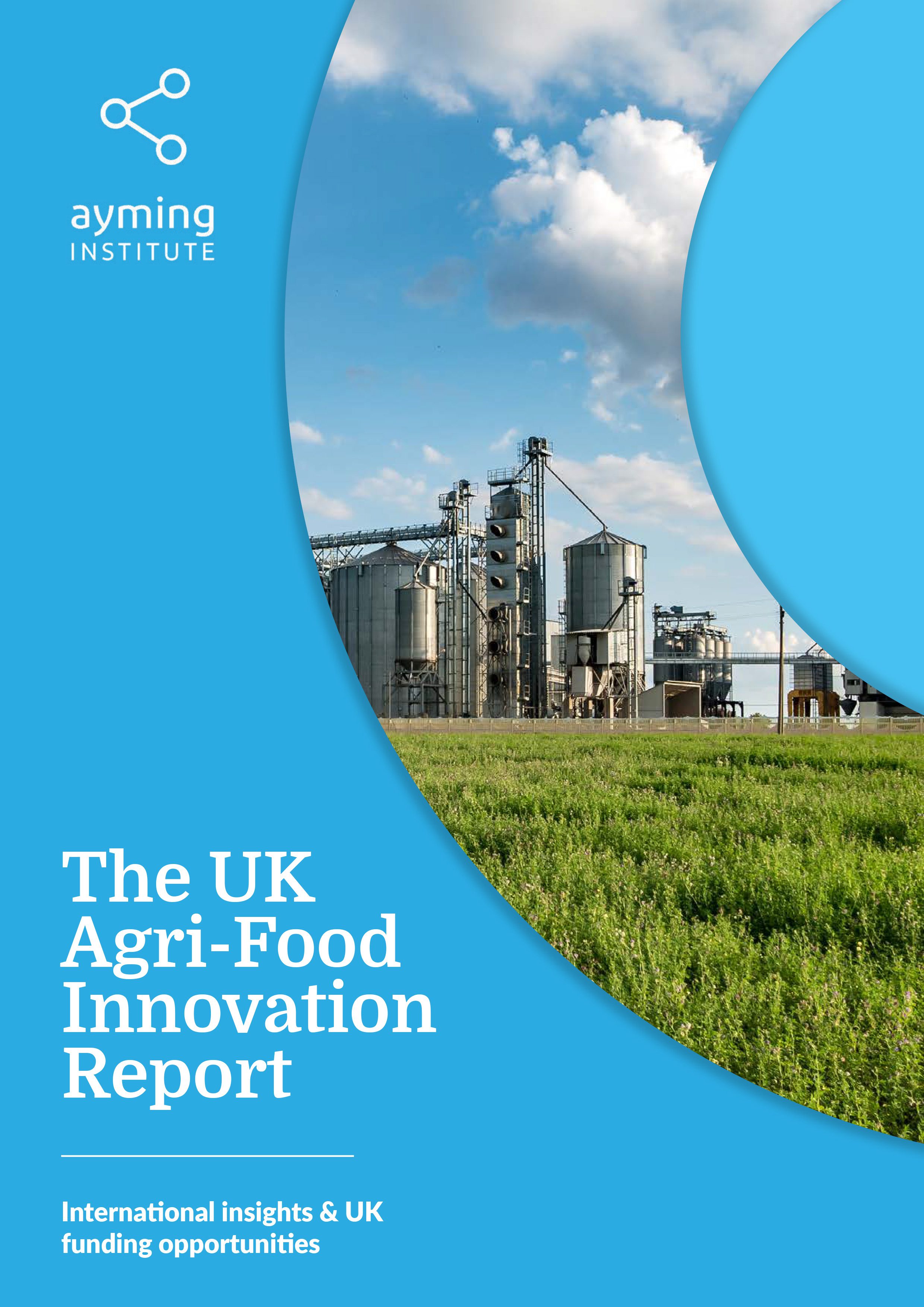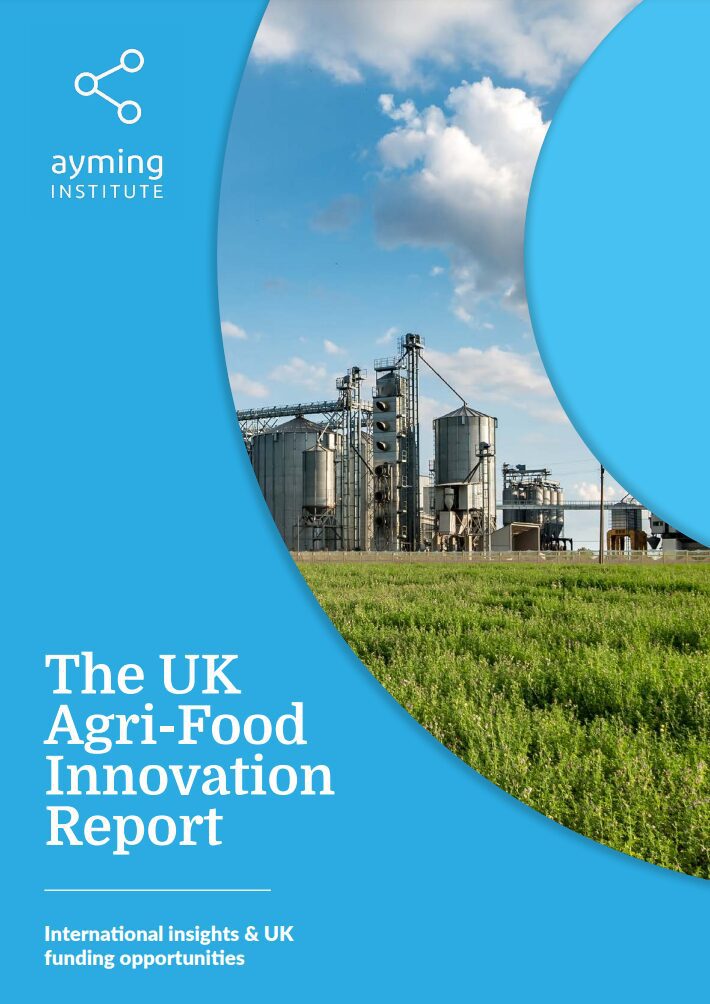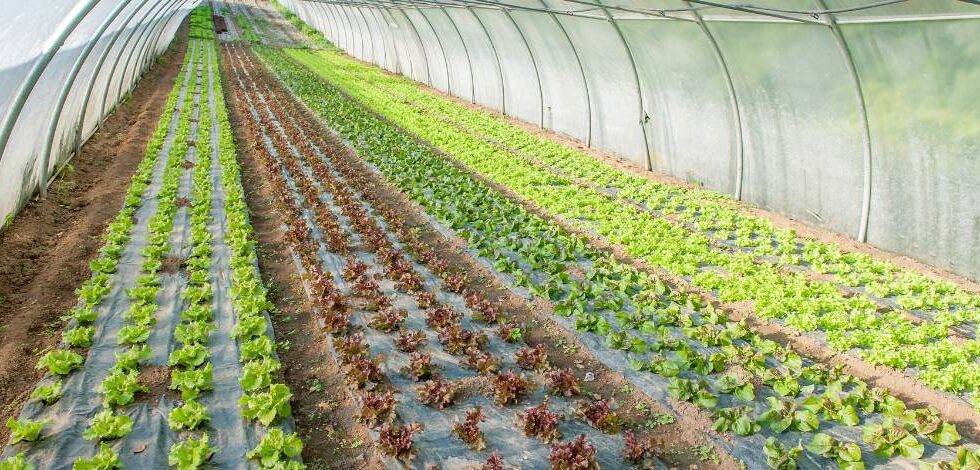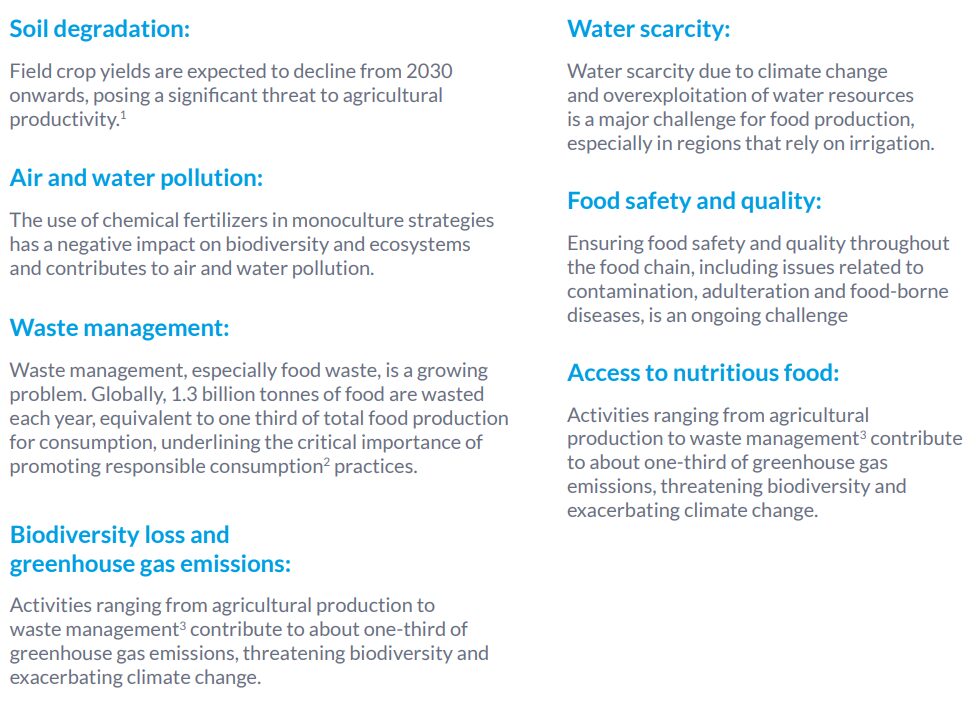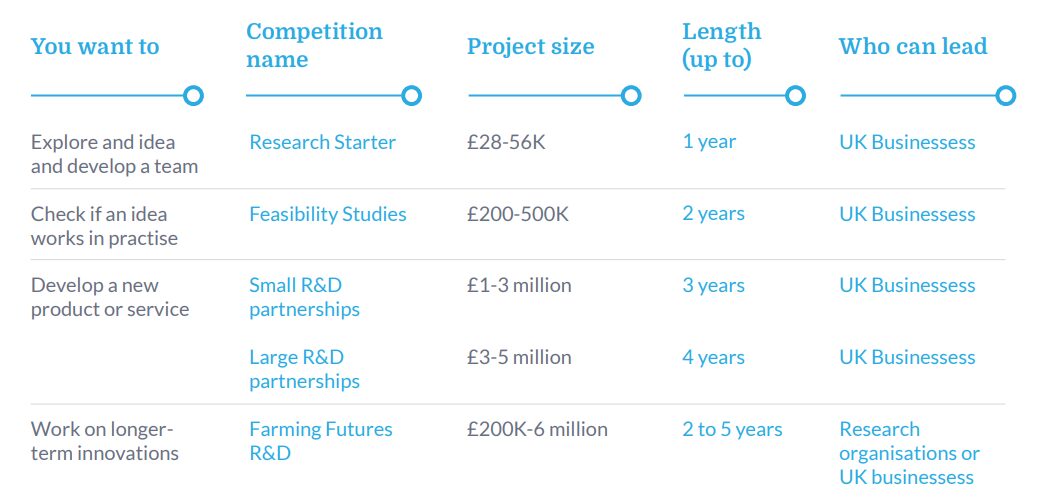
Table of contents
Agri-food: critical sector for the UK
The United Kingdom’s agri-food sector stands out for its abundant agricultural resources, diverse climate conditions, innovative farming methods, and premium-quality products. This sector encompasses various activities and sub-sectors, including crop cultivation, livestock farming, fisheries, food processing, and distribution.
The present condition of the UK’s agri-food industry presents a mix of challenges and opportunities. Global supply chain disruptions, driven by various factors, such as events like the Ukraine conflict, have amplified the demand for British agri-food products in international markets.
However, these disruptions have also brought about adverse effects.
To support the necessary innovation and development within the agri- food industry, the UK Government offers Research and Development Tax Credits and an extensive array of grants. These incentives are meticulously designed to ignite innovation, promote sustainable practices, fortify food security, facilitate market access, expand capacity, and heighten the competitiveness of domestic entities in the global landscape.
As British businesses confront challenges like rising inflation and interest costs, as well as labour market complexities, government innovation funding has become an increasingly indispensable resource. Ayming’s expert Food & Beverage team is dedicated to providing valuable insights into the opportunities available within the UK, helping agri-food businesses drive innovation and advance the overall landscape of the UK’s agri-food sector.
An international agri-food sector in need of a paradigm shift
The current context requires a critical reflection on the agricultural sector and the agri-food industry, as we are faced with pressing challenges such as the need for an ecological transition and the minimisation of negative externalities. It is imperative to envisage a future that optimises environmental sustainability while enabling sufficient production levels to meet consumer preferences. The urgent need for a paradigm shift in the agri-food sector is a major priority for many nations, which are attempting to explore innovative approaches that ensure food production systems are aligned with climate change, resource efficiency and other strategic objectives.
The entire food chain, including production, distribution and consumption, is directly linked to several major challenges:

The importance of production relocation for global ecological transition
In recent years, there has been a growing ecological awareness among civil society and governments worldwide, leading to a renewed focus on the connection between production and consumption, including agriculture and food systems.
Recent events have underscored the need for re-evaluating globalised value chains and the vulnerability of countries to disruptions in the supply of essential products. For example, the war in Ukraine has resulted in a significant increase in prices of commodities, such as wheat and sunflower oil, highlighting the European Union’s dependence on external sources for these goods. Similarly, the COVID-19
pandemic exposed the fragility of global supply chains, with governments struggling to source and transport essential goods and leading to increased attention on food security.
As a result, governments around the world are recognising the importance of relocating production within their national territories to strengthen food security. This approach can revitalise local economies and modernise domestic agricultural practices. By producing food locally, countries can decrease their reliance on international supply chains, promote regional self-sufficiency and reduce the carbon footprint associated with long-distance transportation.
Relocation of strategic sectors: addressing the increasing dependence on imports
The global trend of increasing reliance on imports in various sectors has led to the need for relocation of strategic and essential sectors. This trend is observed in different regions, including the European Union, where the balance of trade has been impacted by high external dependence on commodities such as meat, fishery products, soya, or fresh vegetables. For instance, in France, there is a significant reliance on external sources for proteins, with only 53% of consumption being domestically produced4.
The challenge at hand is to find ways to relocate a substantial portion of the agri-food industry to reduce dependence on imports. The European Union, along with other regions, is under considerable pressure to address the problems associated with this sector. As a response, the ecological transition has been established as one of the pillars of recovery, and many member countries’ recovery plans include development strategies and reorganization efforts for the primary sector and agri-food industry.
Agri-food in the UK – innovation funding
The power of the UK’s R&D Tax Credits scheme for the agri-food sector
n the ever-evolving landscape of the agri-food sector, innovation is key for the future. The agri-food industry faces complex challenges, including the need
to produce more food with fewer resources, mitigate environmental impacts, ensure food safety, and adapt to changing consumer preferences. The UK’s R&D Tax Credit scheme is in place to support the industry in addressing these challenges and in providing support when investing in innovation.
Throughout our collaborative work with the agri-food sector we have found multiple avenues for engaging in qualifying R&D activities that is eligible for tax credit benefits. Here are a few notable examples: 9
Crop Enhancement: Developing novel farming techniques or technologies to improve crop yields while reducing the use of water and chemical inputs. This could involve innovative irrigation systems, pest management strategies, or soil health improvement methods.
Food Produce/Product Development: Creating healthier, tastier, and more sustainable food products involves significant R&D efforts. For instance, developing new varieties of fruits and vegetables or developing methodologies that extended the shelf life of a produce/product.
Supply Chain Efficiency: Optimising supply chain processes to reduce waste, energy consumption, and greenhouse gas emissions is crucial for a sustainable agri-food industry. Initiatives focused on minimising the environmental footprint of food distribution and storage systems.
Precision Agriculture: The use of advanced technologies like drones, satellite imagery, and data analytics to make farming more precise and efficient is an area with substantial R&D opportunities. Innovations in precision agriculture that enhance productivity and sustainability.
Sustainable Packaging: Developing eco-friendly packaging solutions that reduce single-use plastics and environmental impact is another eligible area. Creating biodegradable packaging materials or designing innovative packaging processes.
Food Safety Innovations: Research and development in food safety technologies, such as rapid testing methods for pathogens or contamination control systems.
Ripening innovation: Innovation in progressing our understanding and methodology in the controlled ripening of fresh produce.
The impact of R&D in agri-food
The true impact of R&D Tax Credits within the agri-food sector becomes evident through tangible examples:
Vertical Farming Innovations: Companies throughout the UK have harnessed R&D Tax Credits to pioneer vertical farming techniques. This innovation has enabled year- round, climate-controlled crop cultivation with minimal water and pesticide use, revolutionising agricultural practices.
Plant-Based Protein Development: Numerous agri-food businesses have leveraged R&D Tax Credits to perfect plant-based protein sources. This investment in research and development has yielded innovative meat substitutes and dairy alternatives, addressing the growing demand for sustainable and nutritious dietary choices.
Smart Farming Solutions: The development of smart farming technologies, bolstered by the scheme, has empowered farmers to efficiently monitor and manage their operations.
Reducing Food Waste: Initiatives that employ cutting-edge technology to combat food waste. Solutions like intelligent packaging and storage systems are at the forefront of this battle.
These technologies not only enhance productivity but also conserve vital resources, making farming more sustainable and environmentally friendly.
Empowering sustainable innovation
In essence, the UK’s R&D Tax credits have emerged as a pivotal force in driving innovation within the agri-food industry. By incentivising and financing research and development activities, this enables businesses to transform agriculture and food production into more sustainable, efficient, and consumer-centric processes. This not only strengthens the industry’s innovative landscape but also contributes to broader environmental and economic objectives.
As the UK agri-food sector continues to evolve, R&D Tax credits will remain a vital tool in shaping its sustainable, innovative, and prosperous future.
UK Grants
Unlike R&D Tax credits, Grants for the agri-Food sector are not part of one single scheme and there are a number of different options available. It is also worth noting that innovation grants are distinct from the wide range of grants available for the capital costs of farming and land use more generally.
Defra/UKRI Farming Innovation Programme
The Farming Innovation Programme is part of Defra’s investment in innovation, research and development.
Defra partners with UK Research and Innovation (UKRI) to fund projects that benefit farmers, growers and foresters in England. All funding is awarded through competitions. This means applications for each competition will be judged, and only the successful ones will be funded.
The programme’s aims are to:
- Help farmers, growers and foresters increase productivity, sustainability and resilience reduce the environmental impact of agriculture and horticulture
- Apply agricultural research to provide real benefits for farmers, growers and foresters
- Use science to develop solutions for the practical challenges in agriculture and horticulture
Farming Innovation Programme: which competition to apply for

Other examples of specific grant funds available for the Agri-Food sector include:
UK Seafood Fund (£100m)
The UK government’s Seafood Innovation Fund (SIF) is a research and development (R&D) fund that launched in July 2019. The SIF programme is now part of the UK Seafood Fund under the Science and Innovation pillar.
The fund is administered by the Centre for Environment, Fisheries and Aquaculture Science (Cefas) on behalf of Defra.
The fund supports projects, ideas and technologies that aim to disrupt the seafood sector. Disruptive innovation is when the application of the technology or idea has a significant impact on the industry or the market.
Smart Sustainable Plastic Packaging Challenge Fund (£60m)
With a portfolio of over 70 funded projects, the SSPP challenge is the largest and most ambitious UK government investment to date in sustainable plastics research and innovation, driving cleaner growth across the UK’s plastics, packaging and retail supply chains. This fund supports Agri-Food businesses responding to customer demand for more sustainability and accountability in food packaging.
Budget: £60 million
Duration: From 2019 to 2025
Funding Bodies: Innovate UK (lead), Natural Environment Research Council
Thanet Earth case study
The Fresca Group, currently made up of 13 companies sources, supplies, prepares, packs and delivers the finest quality fresh produce to
customers all over the UK, including supermarkets and multiple retailers to wholesalers, foodservice companies and caterers.
The first of the Fresca companies to start working with Ayming was Thanet Earth in 2021, for its 2019 financial year. Based in East Kent, Thanet Earth hadn’t previously claimed R&D Tax credits for its ongoing innovations in growing. Ayming supported Thanet Earth throughout the cohesive claim process, removing the burden and creating new value to add to the bottom line.
More of Fresca’s innovative agri-food businesses are coming online to work with Ayming to deliver significant financial benefit to the group and to support its ongoing commitment to research and development.
As an agri-food business that has a commitment to continuous innovation throughout its portfolio, Thanet Earth’s work with Ayming is bringing significant financial benefit to support our business and deliver for customers. The Ayming team quickly understood our business and was able to implement consistent, collaborative and efficient processes to help us realise the benefits which we were entitled to. We look forward to working with Ayming on our future innovation funding.



